by M. C. Jennings | May 10, 2018 | Academics, COBA Events, COBA Faculty, COBA Staff, College Decisions, Current Students, Faith Infusion, Outcomes, Social Entrepreneurship, Uncategorized
Graduation is only a few days away and it’s the time of year we sadly say goodbye to our graduating seniors. We are proud of our students and we’d like to introduce you to a few of them on this blog, letting you know how their time at ACU has molded them, where they are headed after graduation, and what advice they have for the new freshmen class coming in the fall.
Allie Cawyer, Marketing major from Plano, Texas
After graduation, I will be moving back to Dallas and hoping to work in the corporate event industry.
For the last year, I have been working with University Events here at ACU and it has only made me more excited to pursue events full time. So, getting to actually do events all the time and working in that position is making me excited for graduation. Plus, no event is the same so I will not have to worry about doing the same thing every day.
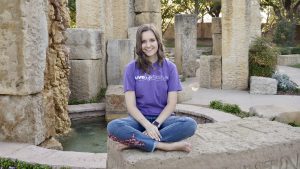
Allie Cawyer
My favorite ACU memory was probably when I studied abroad two summers ago. The experience was unlike any other and I not only learned about all of the other cultures but also about myself.
My favorite class was Leadership Summit because I got credit for taking a class in the mountains of Colorado, but the takeaway was much more than just the credit hours. So many people poured into us during that week with life lessons, truth and God’s word that nothing can compare to it.
My advice would be to be as involved as you can within your department, no matter what it may be. Get to know not only your classmates but also your professors because they truly care about you and your life. Start it early on, so that you get the full experience all four years.
Steven Yang, English major and COBA Student Worker from Chiang Rai, Thailand
After graduation, I am going to Regent University of Law in Virginia Beach, Virginia. I am excited to be done with my undergrad and be able to travel home and see my family in Thailand.
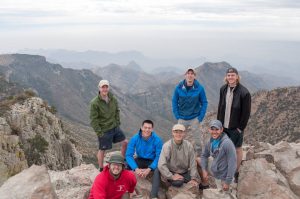
Steven (tan jacket in the middle) and friends hiking over Spring Break.
My favorite memory at ACU is climbing different buildings, having game nights, and biking around Abilene.
My favorite class was Literature for Young Adults because reading stories from this class connects me to my past and helps me find my identity.
I would tell incoming freshmen to work hard
but never lose the ability to see the silver-lining in life. Life is too short and too hard to not be happy.
Katie Isham, Accounting major from Decatur, Texas
After graduation, I plan to work at PwC in Dallas as an Audit Associate. I’m most excited to go out and use the skills and knowledge I’ve learned throughout college to bless others. I’m not sure what that will look like, but I know that God has big plans- I’m just glad to be a part of them!
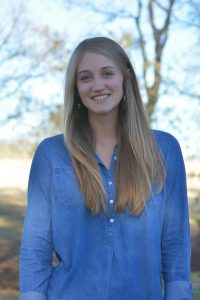
Katie Isham
My favorite ACU memory…. hmmm. There’s not a certain memory that sticks out to me, rather my favorite thing about ACU is the people. Finding and creating friendships with diverse people who have the same aim, to love the Lord by loving others, has been instrumental in making me who I am.
My advice to incoming freshmen is don’t be afraid to step outside of your comfort zone. You’ll regret the opportunities you didn’t take and the friends you didn’t make. Keep your relationship with the Lord your main priority and join a church and Bible study right away! Regardless of what happens in your next four years, know that God so loved you that he sent his son to die for you as an atonement for your sins, so that through GRACE you are saved, not by your own works. Give all the glory to God!
Jack Oduro, Accounting major from Garland, Texas
After graduation, I am going to take a missional focused trip to Ghana for
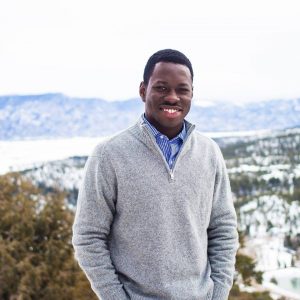
Jack Oduro
the summer. Then, I begin getting ready for my full time job with Weaver & Tidwell LLP in Dallas. I am excited about graduation and grateful that all of my family is in one place for the first time in two years.
My favorite ACU memory is…truly, any time I got to spend time with the people at this school was inspiring. Some of my best moments may include late night strolls around campus and potential trespassing with life-long friends, friendships which began here.
My favorite classes were Social Entrepreneurship with Laura Philips and Leadership Summit with the Lytle Center for Faith and Leadership. They are both up there in the extraordinary classes category. They both live up to ACU’s commitment of creating leaders for Christian service around the world.
My advice for the fishy is to seek to genuinely serve others because big changes start with the little acts of service.
Congratulations to the class of 2018! As Minor Meyers said, “Go into the world and do well. But more importantly, go into the world and do good.”
by M. C. Jennings | May 7, 2018 | Academics, COBA Events, Current Students, Uncategorized
Each year, COBA inducts new members into the ACU Chapter of Beta Gamma Sigma, the international honor society serving business programs accredited by AACSB International (the Association to Advance Collegiate Schools of Business). Membership in BGS is the highest recognition a business student can receive in an AACSB accredited business program and a student must be in the top 10% in order to be asked to join the organization.

Last month, at a luncheon in their honor, COBA welcomed 34 new members to the chapter. Current BGS officers and faculty encouraged the new members to continue to learn and lead with integrity, honor, and commitment to excellence and asked them to be active participating members in the ACU Chapter, helping to further advance the mission of the College of Business Administration.
Dr. Andy Little, Associate Dean for COBA, said, “Beta Gamma Sigma is COBA’s academic honors society for business majors. It is an important recognition for these students, because it is an invitation-only organization, and membership signifies hard work, dedication, intelligence, and commitment. Within the organization, at ACU we emphasize honor, wisdom, and earnestness. The students complete service projects during the year, as well as other activities.”
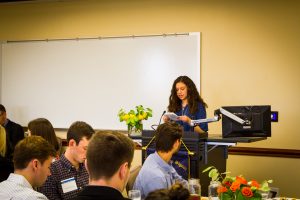
Membership in Beta Gamma Sigma provides many benefits, including educational and professional opportunities to support members on campus and throughout their professional lives. Click here to learn more about Beta Gamma Sigma. Congratulations to our newest BGS members!
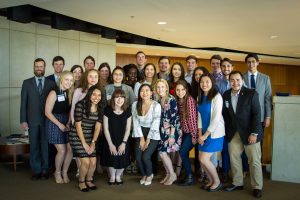
2018 Beta Gamma Sigma Inductees are:
Luke Anthony
Kasey Birchfield
Noah Brinegar
Shannon Buergner
Ivria Bunner
Adam Chambers
William Clevenger
Nicholas Cromwell
Slade Downs
Jennifer Estrada
Alexander Faure
Jack Gibbens
Nathan Harrell
Kennedy Jones
Meagan Kurosky
Devanie Lail
Taylor Langlais
Jolene Liow
Eden Lopez
Karla Mendoza
Kristy Ng
Emily Padgett
Emily Parisi
Lessly Rocha
Daniel Seibert
Nathan Sherrill
Taryn Smith
Allison Sorrells
Luke Stevens
Allen Storm
Daniel Vensel
Jemaimah Wavamunno
Janely Williams
Connor Wilson
by M. C. Jennings | May 4, 2018 | Academics, Accounting, COBA Faculty, Current Students, Faith Infusion, MAcc, Uncategorized
COBA honored the MAcc (Master of Accountancy) class of 2018 at a luncheon on Thursday, May 3rd that was sponsored by KPMG. Special guest speaker was Cliff Crockett (’89), Partner at KPMG and father of graduating MAcc student, Daniel Crockett.

Cliff Crockett
Mr. Crockett gave the students 10 tips for success as they begin their careers.
- Character and integrity count. Be trustworthy and admit your mistakes. “Blessed is the one who does not walk in step with the wicked or stand in the way that sinners take or sit in the company of mockers, but whose delight is in the law of the Lord, and who meditates on his law day and night. That person is like a tree planted by streams of water, which yields its fruit in season
and whose leaf does not wither—whatever they do prospers.” Psalm 1:1-3
- Establish goals and learn to manage yourself and your career. Begin with the end in mind and ask yourself where do you want to be in 5 or 10 years? Reassess your goals at different points along the way. Invest in and work to continually improve yourself. Root your goals in prayer and God. “Commit to the Lord whatever you do, and he will establish your plans.”Proverbs 16:3
- Find a mentor(s) inside and outside of your employer, preferably someone older who can give you different perspectives. As you grow older, find someone you can mentor.
- What are your priorities in life going to be? Your priorities reflect where you spend your time.
- Be a lifelong learner. Always seek to learn something new. Continue to learn and cultivate your relationship with God.
- Be a servant leader. Put others first and be an encourager. Be salt and light in the world.
- Remember where you came from. Remember your roots – especially ACU. Stay connected to and be proud of being an ACU graduate. Remember the investment others have poured into you and pay it forward to the next generation of students that come through ACU.
- Stay involved with your church and community.
- Remember to give back. Give of your time and talents, not just your money. Make giving back the first thing you do – be intentional about it. Remember who your money belongs to.
- Keep your eyes on Jesus. Everything falls in to place if you keep your eyes on Jesus. “Therefore, since we are surrounded by such a great cloud of witnesses, let us throw off everything that hinders and the sin that so easily entangles. And let us run with perseverance the race marked out for us, fixing our eyes on Jesus, the pioneer and perfecter of faith. For the joy set before him he endured the cross, scorning its shame, and sat down at the right hand of the throne of God.” Hebrews 12:1-2

Kaitlyn Renner Allen and Dr. John Neill
Dr. John Neill presented the Outstanding MAcc Graduate of the Year award to Kaitlyn Renner Allen. As an undergraduate student, Kaitlyn majored in Accounting while maintaining a perfect 4.0 GPA throughout the undergraduate and graduate accounting programs. She was President of Beta Gamma Sigma Business Honors Society; a member of Phi Eta Sigma Academic Honor Society; and a member of GATA Women’s ACU Social Club. She has received the following honors: Dean’s Honor List; R.L. Money Chancellors Award; Valedictorian Scholarship, Accounting Education Foundation of the Texas Society of CPAs scholarship, and the Abilene Chapter of the Texas Society of CPAs award. Last spring, she had the opportunity to intern with PwC in Dallas and she has accepted a full-time position as a Tax Staff Accountant in the Ft. Worth office starting this July.

Dr. Scott Stovall reads his blessing over the graduates
Dr. Scott Stovall gave this blessing over the graduates:
We accounting and finance faculty offer you our blessing. It has been an honor to teach and serve you. Your spirit, your curiosity, and your servant heart have lifted us up while you have been here. Your attitude has amazed us and perhaps a few times disappointed us. As you prepare to leave us, we ask that you remember a few things.
First, remember that God is Sovereign over everyone and everything. As one of His children, your sole purpose on this earth is to glorify Him. As you begin your career, remember to be the best professional that you can be. God has called you to do everything as though you are doing it for Him. Should you choose to marry someone and raise children, ground those relationships in God’s love. Follow the advice that my grandfather once gave me and choose a mate who will help you, and who you can help, get to Heaven. Show your children (and your grandchildren) what God is like.
Second, remember to take great care about wealth and money. Don’t live beyond your means. God will bless some of you with the talent to make money, and we hope that you in turn bless God’s Kingdom with that talent. On the other hand, there may be no greater threat to your spirituality than to become entangled by pursuing wealth and things. Jesus likened riches to weeds that can choke out the Word of God. Using Paul’s words to Timothy, remember that, “…godliness with contentment is great gain.”
Third, remember that Jesus is your salvation. You will fail many times over your lifetime. Remember that in Christ, failure is victory. You will glorify God if you remain in His grace. There is no failure, mistake, or sin from which Christ is unable to redeem you. God is always, ALWAYS waiting on you.
Finally, remember that we faculty, your COBA family and your Christian brothers and sisters love you. Hold each other accountable. Be transparent with weakness. Show strength by reaching out to others for help. Although you are graduating, treat us as a “city of refuge” to which you will travel to share both joy and sorrow. Be good stewards of the reputation you now have as MACC program graduates.
With paraphrased words of our Savior from many years ago, Dear Father:Bless us to be poor in spirit, for ours is the kingdom of heaven. Bless us to be mournful, for we will be comforted. Bless us to be meek, for we will inherit the earth. Bless us to hunger and thirst for righteousness, for we will be filled. Bless us to be merciful, for we will be shown mercy. Bless us to be pure in heart, for we will see God. Bless us to be peacemakers, for we will be called sons (and daughters) of God. Bless us as we are persecuted because of righteousness, ours is the kingdom of heaven. Amen.

The MAcc Class of 2018
Graduates, your adventure begins now. Congratulations to the Master of Accountancy graduating class of 2018!
To download and/or order prints of pictures from the luncheon, click here.
by Hanna Roberts | May 2, 2018 | Academics, COBA Faculty, College Decisions, Current Students, Faith Infusion, Uncategorized
Personal Financial Planning (FIN 416) is an introduction to the methodology and discipline of personal financial planning. The class focuses on the comprehensive and ongoing planning process that seeks to quantify personal financial objectives. Dr. Kyle Tippens has taught Personal Financial Planning for several years. Tippens was personally motivated to teach this class because it covers a topic that he has always been interested in and researched. He had spent a lot of time talking with his colleagues about real-world financial matters that affected them and is always trying to figure out how to save for the future in the best way possible.
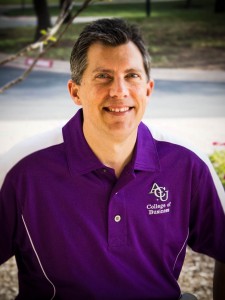
Dr. Kyle Tippens, Professor
In Personal Financial Planning, Tippens begins with what the Bible has to say about money. “We talk a lot about stewardship, giving, and what those mean for those who live a life called to Christ and practical ways to put those in practice,” said Tippens. Students learn how to plan for themselves and about all of the seemingly-daunting financial decisions they will soon start to make. They learn about savings and checking accounts, budgeting, what insurance to buy or not buy, how to save for retirement, estate planning, and much more. Tippens wants students to understand that finances do not have to be overwhelming. Breaking it down into pieces helps to demystify finances and students often realize that it is not as complicated as people make it seem. “Students often describe this class as the learning-how-to-be-an-adult class,” said Tippens. “At the bottom line, it is about how to be out in the real world and not be overwhelmed by all of the choices that will be available to you.”
Many students who have taken Personal Financial Planning have contacted Tippens after graduation and tell him how they have used materials from the class just weeks after graduating and feel more ready and prepared than most of their peers. Aric Wilson, a sophomore management major from The Woodlands, is currently taking Personal Financial Planning. “I was amazed by how many everyday things that I will definitely need to know after graduation that I had no clue about,” noted Wilson. “This class is about life and how to succeed in the future and I feel much more prepared for taking it.” Wilson also appreciated how Tippens teaches the class using personal examples from his life and believes that the reason he gets so much out of the class is the way Tippens works hard to teach it in relatable ways. Even though there are so many practical topics that are thoroughly covered and explained in Personal Financial Planning, Tippens hopes that a student’s biggest takeaway from the class is the importance of generosity, saving, and living beneath their means.
Another unique aspect of Personal Financial Planning that it has no prerequisites, which is very unusual for a 400-level finance class. “Regardless of your major,” explained Tippens. “If you focus on the class you will do well. There are no incredible math skills necessary.” For this reason, Personal Financial Planning is a popular elective all around campus. Students of all majors have registered for the class to learn more about preparing for their future. Olivia Dahl, a senior biology major from Round Rock, took Personal Financial Planning because she wanted to be prepared to succeed financially, especially as she enters medical school soon. Dahl believes that this class is the most practical one she has taken during her time at ACU and would encourage others to take this class because it is an easy way to be exposed to important information. “Dr. Tippens made it easy and painless to learn,” Dahl said. “It was obvious that he wanted to give us this information so that we could be prepared for the future. I would tell every student that has room in their degree plan to take this course.”
Personal Financial Planning is offered in both the fall and the spring. There are no class prerequisites but, to enroll, a student must have already completed 72 earned hours. The practical nature of the class and the dedicated, Christ-centered instruction from Dr. Tippens make Personal Financial Planning an invaluable class to students from every major at ACU.
by M. C. Jennings | Apr 4, 2018 | Academics, COBA Events, Current Students, Faith Infusion, Student Spotlights, Uncategorized
COBA donors, scholarship recipients, Dean’s Council, and faculty and staff gathered on Thursday, March 22nd, at the annual Ruth Allen Griggs Scholarship Luncheon. The luncheon, inspired by the memory of the hospitable Ruth Allen Griggs, seeks to honor the spirit of generosity and to encourage others to give back. Each table was buzzing with discussion as students, donors, and faculty members conversed about their experiences at ACU and why giving is so important.
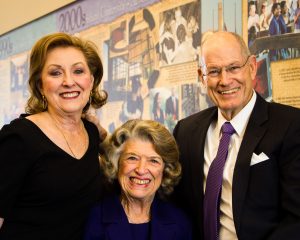
Ann Griggs, Ann Berger Griggs, and Jack Griggs
Students Anna Hornell, junior management major from Fort Worth, TX, and Darius Bell, senior computer science major from Frisco, TX, represented students who have received COBA scholarships, speaking to the audience about what receiving those scholarships has meant to them and the impact that it has had on their education and experiences at ACU.
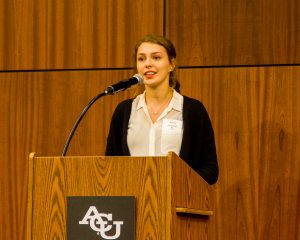
Anna Hornell, junior management major from Fort Worth, TX
Anna said, “The Ruth Allen Griggs Luncheon was such an amazing opportunity for students and donors to meet! It was a time for students to express gratitude to those who allowed them enriching and even life- changing opportunities and to be inspired to generosity both now and in the future. I am hopeful that donors enjoyed connecting with students and hearing about the experiences that they have blessed them with.”
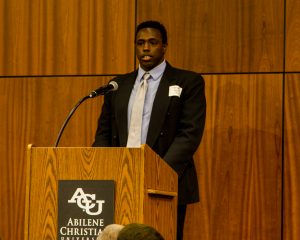
Darius Bell, senior computer science major from Frisco, TX
Darius said, “Giving back creates a thread that binds us all together. Although it is not always easy or convenient, it gives birth to community, community gives birth to a culture, and a culture gives birth to a lasting hope. Receiving this scholarship from the College of Business Administration revealed to me that ACU’s mission and vision extends past the plaques the name is written on and actually lives within the hearts and lives of the donors.”
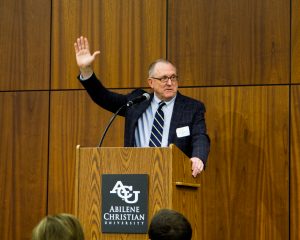
Gary Skidmore, guest speaker, talks about the importance of giving
Gary Skidmore, Chairman of Aberdeen, member of the COBA Dean’s Council, and former ACU Board Trustee spoke to the crowd, relaying a story Dr. Condoleezza Rice tells about her grandfather. “She said that when her grandfather went to college, he paid for his first year in cotton. His sophomore year, he was asked how he would pay for school and he said, ‘I am out of cotton,’ so they said, ‘You are out of luck.’ He asked how the other boys were going to pay. They said, ‘They have what is called a scholarship and if you wanted to be a Presbyterian minister, you could have a scholarship, too.’ My grandfather said, ‘That is exactly what I had in mind.’ Dr. Rice stated that ‘My family has been Presbyterian and college educated ever since. That access to education changed everything. Not just for him, but for generations to come.” Skidmore noted that because of her family’s legacy of education, Condoleezza Rice has gone on to become both a Professor and Provost at Stanford University, National Security Advisor, and Secretary of State. He went on to say, “We’ve all likely received some sort of scholarship” citing statistics that 75% of all college students receive some sort of financial aid and that scholarships are one way we model what Jesus taught us as Christians – to help others. He stated, “We don’t know what will happen if someone is enabled to attend ACU…how their life will be changed. I know I don’t want to learn someday, if only someone had given, cancer would have been cured. In giving, both the giver and the receiver benefit.”
Dean Brad Crisp summed the event up by saying, “The Griggs Luncheon is a favorite event of mine because of the way it reflects and underscores our values. As COBA updates our guiding statements to describe our deeply held values, we are emphasizing how our Christian faith leads us to gratitude and generosity. This event allows our students to express their gratitude for the generosity of our donors.”
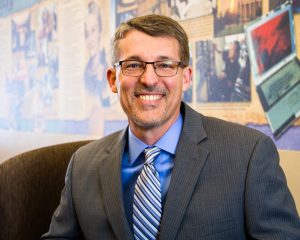
Dr. Brad Crisp
by Hanna Roberts | Apr 2, 2018 | Academics, Current Students, Faith Infusion, Marketing, Poverty and Development, Student Spotlights, Student Spotlights, Uncategorized
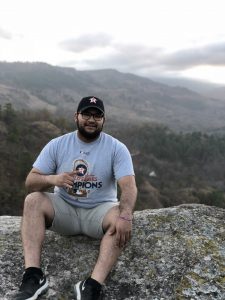
Caleb Casas, junior management and marketing major from Houston, TX.
Over spring break, the Griggs Center and Halbert Institute partnered to send a group of students led by Dodd Roberts with Dr. Sarah Easter to Honduras. The group collaborated with Mission Lazarus to work within the communities on a service trip. Caleb Casas, a junior marketing and management major from Houston, was one of the students who went and served. Part of the trip entailed meeting with small business owners to help them with current endeavors and to develop new business ideas. Led by Dr. Sarah Easter and Erika Teilmann, a junior management major from Houston, the group of students met for several weeks before their departure to learn about the business climate of the communities they would be working amidst in Honduras. They researched the businesses, resource availability, education levels, income levels, and more. The group kept it a priority to remember that they were not the experts and that they need to trust the people that actually live and work with people in those communities, the people that understand the everyday circumstances, to determine the feasibility of an idea. The students were challenged to read Philippians 2:1-8 before going into the communities to prepare a servant heart within themselves and to learn of and how to imitate Christ’s humility.
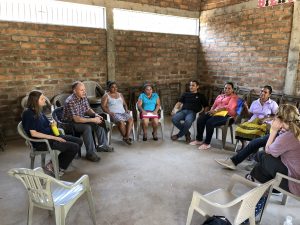 Caleb and the other students met with locals in Namasigue and Cedeño, villages in Honduras, to help build existing businesses and develop new ideas. The people talked about how they would use their businesses to help out the community: to make it possible for everyone to have a little money to buy from one another, to send kids to school, to give to the church, to employ others, and more. In the Namasigue village, all of the businesses are tied together. If only a few people operate a business, then the rest of the village would be unable to purchase from them and would force business owners to sell to ‘coyotes,’ people from bigger cities who come to purchase products in the villages at an extremely low price. It seemed to Caleb that the people had an excellent grasp of how to operate a business in the village but desired feedback on their ideas. They taught the villagers basic accounting so that they could better run their businesses by keeping accurate records, financial statements, and balancing the cost of the business. Both the students and the villagers were able to learn a lot from each other. For example, they met with a woman who planned to sell pigs and wanted to start off with ten. The group encouraged her to start off with three and to buy three pigs every few months so that she had a cycle of product and a steady stream of income instead of trying to sell all of her pigs at the same time. The group suggested that she purchase a male and female to begin breeding so that she wouldn’t have to buy pigs to resell but the women explained that the time and money it takes to breed with the resources available to her was too great for her to ever make a profit.
Caleb and the other students met with locals in Namasigue and Cedeño, villages in Honduras, to help build existing businesses and develop new ideas. The people talked about how they would use their businesses to help out the community: to make it possible for everyone to have a little money to buy from one another, to send kids to school, to give to the church, to employ others, and more. In the Namasigue village, all of the businesses are tied together. If only a few people operate a business, then the rest of the village would be unable to purchase from them and would force business owners to sell to ‘coyotes,’ people from bigger cities who come to purchase products in the villages at an extremely low price. It seemed to Caleb that the people had an excellent grasp of how to operate a business in the village but desired feedback on their ideas. They taught the villagers basic accounting so that they could better run their businesses by keeping accurate records, financial statements, and balancing the cost of the business. Both the students and the villagers were able to learn a lot from each other. For example, they met with a woman who planned to sell pigs and wanted to start off with ten. The group encouraged her to start off with three and to buy three pigs every few months so that she had a cycle of product and a steady stream of income instead of trying to sell all of her pigs at the same time. The group suggested that she purchase a male and female to begin breeding so that she wouldn’t have to buy pigs to resell but the women explained that the time and money it takes to breed with the resources available to her was too great for her to ever make a profit.
 The students also built latrines in the villages as a part of Mission Lazarus’ public health campaigns that aim to engage the community through health promotion and prevention and share essential health teachings with families and communities. The latrines were a tremendous step in both sanitation and privacy for families in the communities. Caleb was struck by how something as small as a latch on a bathroom door gave people basic human dignity. “In America, we don’t have to ever worry about finding a private bathroom to use no matter where we go,” said Caleb. “But the simple act of installing a two-dollar latch allowed these people to go about their business in private and gave them dignity. There was a man who had gone over eighty years without a private bathroom and I was struck by how often I take something like a toilet for granted.” Caleb was also moved by the Hondurans’ gratitude and willingness to work. “They didn’t want us to do the work for them but wanted to work alongside us,” he noted. For the families to even receive a latrine, they had to dig the hole themselves before people would come install the physical latrine. For some people, this meant digging a twelve-foot hole with nothing but a shovel and a chisel. One man chiseled through two feet of solid rock alone. Even though they had done all of this back-breaking work to lay the foundation for the latrines, when the students came to install them, the villagers worked alongside them, helping mix and lay concrete, drilling, and installing the roof. After they had finished installing one of the latrines, a man came and gave them mangoes, which was all he had to give. Caleb was amazed that the people were so grateful that they were willing to give up all that they had to say thank you to the students.
The students also built latrines in the villages as a part of Mission Lazarus’ public health campaigns that aim to engage the community through health promotion and prevention and share essential health teachings with families and communities. The latrines were a tremendous step in both sanitation and privacy for families in the communities. Caleb was struck by how something as small as a latch on a bathroom door gave people basic human dignity. “In America, we don’t have to ever worry about finding a private bathroom to use no matter where we go,” said Caleb. “But the simple act of installing a two-dollar latch allowed these people to go about their business in private and gave them dignity. There was a man who had gone over eighty years without a private bathroom and I was struck by how often I take something like a toilet for granted.” Caleb was also moved by the Hondurans’ gratitude and willingness to work. “They didn’t want us to do the work for them but wanted to work alongside us,” he noted. For the families to even receive a latrine, they had to dig the hole themselves before people would come install the physical latrine. For some people, this meant digging a twelve-foot hole with nothing but a shovel and a chisel. One man chiseled through two feet of solid rock alone. Even though they had done all of this back-breaking work to lay the foundation for the latrines, when the students came to install them, the villagers worked alongside them, helping mix and lay concrete, drilling, and installing the roof. After they had finished installing one of the latrines, a man came and gave them mangoes, which was all he had to give. Caleb was amazed that the people were so grateful that they were willing to give up all that they had to say thank you to the students.
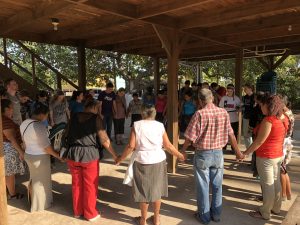 In Honduras, Caleb experienced and was impacted by was God’s purpose and design in bringing us to a specific time and place. Caleb’s grandfather was a pastor in Mexico but came to the US to start a Spanish-speaking congregation within Bammel Church in Houston. Caleb remembered hearing stories about his grandma growing up in Saltillo – no running water, an outhouse that was a mile away, playing soccer with rocks – and realized that, if it had not been for his grandfather saying “yes” to the Lord and leaving his work in Mexico, Caleb could have been in a similar situation to the people he was serving in Honduras. “I was serving what could have been my grandpa,” Caleb realized. “Maybe in three generations, like my family, those people could be in America or helping grow Honduras. You never know what impact you or God will have on people and their life trajectory.”
In Honduras, Caleb experienced and was impacted by was God’s purpose and design in bringing us to a specific time and place. Caleb’s grandfather was a pastor in Mexico but came to the US to start a Spanish-speaking congregation within Bammel Church in Houston. Caleb remembered hearing stories about his grandma growing up in Saltillo – no running water, an outhouse that was a mile away, playing soccer with rocks – and realized that, if it had not been for his grandfather saying “yes” to the Lord and leaving his work in Mexico, Caleb could have been in a similar situation to the people he was serving in Honduras. “I was serving what could have been my grandpa,” Caleb realized. “Maybe in three generations, like my family, those people could be in America or helping grow Honduras. You never know what impact you or God will have on people and their life trajectory.”
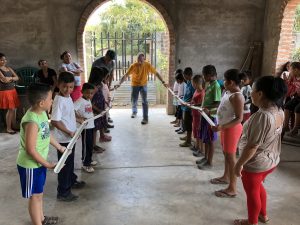 Another surreal moment that Caleb experienced in Honduras was meeting Luis, the preacher of the Honduran church the group was working with. Luis was born in Honduras but moved to the US and actually attended Caleb’s Bammel. Bammel Church sponsored Luis to attend the Baxter Institute, a seminary school in Guatemala. Caleb’s grandfather also taught classes at Baxter during Luis’ time there. Once Luis graduated, he had twenty-three churches where he could have served but felt a calling to go to Namasigue. Caleb was amazed at how God brought them together and connected them at this specific time and place where they were both serving together. “There were so many points in our lives where things could have happened differently,” Caleb said. “Nonetheless, God intersected our lives and that made an impact on me.”
Another surreal moment that Caleb experienced in Honduras was meeting Luis, the preacher of the Honduran church the group was working with. Luis was born in Honduras but moved to the US and actually attended Caleb’s Bammel. Bammel Church sponsored Luis to attend the Baxter Institute, a seminary school in Guatemala. Caleb’s grandfather also taught classes at Baxter during Luis’ time there. Once Luis graduated, he had twenty-three churches where he could have served but felt a calling to go to Namasigue. Caleb was amazed at how God brought them together and connected them at this specific time and place where they were both serving together. “There were so many points in our lives where things could have happened differently,” Caleb said. “Nonetheless, God intersected our lives and that made an impact on me.”
Caleb was absolutely impacted during his time in Honduras. The opportunity to serve and work alongside the people in Namasigue and Cedeño showed him how God works in incredible and mind-blowing ways and His plan is always good. Caleb looks forward to the potential to return to Honduras soon and is even talking about going back this summer.








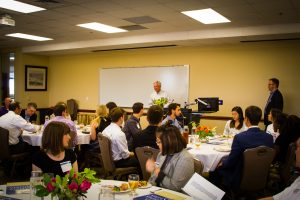









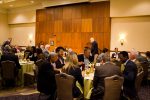

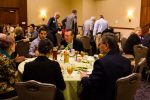


 Caleb and the other students met with locals in Namasigue and Cedeño, villages in Honduras, to help build existing businesses and develop new ideas. The people talked about how they would use their businesses to help out the community: to make it possible for everyone to have a little money to buy from one another, to send kids to school, to give to the church, to employ others, and more. In the Namasigue village, all of the businesses are tied together. If only a few people operate a business, then the rest of the village would be unable to purchase from them and would force business owners to sell to ‘coyotes,’ people from bigger cities who come to purchase products in the villages at an extremely low price. It seemed to Caleb that the people had an excellent grasp of how to operate a business in the village but desired feedback on their ideas. They taught the villagers basic accounting so that they could better run their businesses by keeping accurate records, financial statements, and balancing the cost of the business. Both the students and the villagers were able to learn a lot from each other. For example, they met with a woman who planned to sell pigs and wanted to start off with ten. The group encouraged her to start off with three and to buy three pigs every few months so that she had a cycle of product and a steady stream of income instead of trying to sell all of her pigs at the same time. The group suggested that she purchase a male and female to begin breeding so that she wouldn’t have to buy pigs to resell but the women explained that the time and money it takes to breed with the resources available to her was too great for her to ever make a profit.
Caleb and the other students met with locals in Namasigue and Cedeño, villages in Honduras, to help build existing businesses and develop new ideas. The people talked about how they would use their businesses to help out the community: to make it possible for everyone to have a little money to buy from one another, to send kids to school, to give to the church, to employ others, and more. In the Namasigue village, all of the businesses are tied together. If only a few people operate a business, then the rest of the village would be unable to purchase from them and would force business owners to sell to ‘coyotes,’ people from bigger cities who come to purchase products in the villages at an extremely low price. It seemed to Caleb that the people had an excellent grasp of how to operate a business in the village but desired feedback on their ideas. They taught the villagers basic accounting so that they could better run their businesses by keeping accurate records, financial statements, and balancing the cost of the business. Both the students and the villagers were able to learn a lot from each other. For example, they met with a woman who planned to sell pigs and wanted to start off with ten. The group encouraged her to start off with three and to buy three pigs every few months so that she had a cycle of product and a steady stream of income instead of trying to sell all of her pigs at the same time. The group suggested that she purchase a male and female to begin breeding so that she wouldn’t have to buy pigs to resell but the women explained that the time and money it takes to breed with the resources available to her was too great for her to ever make a profit. The students also built latrines in the villages as a part of Mission Lazarus’
The students also built latrines in the villages as a part of Mission Lazarus’  In Honduras, Caleb experienced and was impacted by was God’s purpose and design in bringing us to a specific time and place. Caleb’s grandfather was a pastor in Mexico but came to the US to start a Spanish-speaking congregation within
In Honduras, Caleb experienced and was impacted by was God’s purpose and design in bringing us to a specific time and place. Caleb’s grandfather was a pastor in Mexico but came to the US to start a Spanish-speaking congregation within  Another surreal moment that Caleb experienced in Honduras was meeting Luis, the preacher of the Honduran church the group was working with. Luis was born in Honduras but moved to the US and actually attended Caleb’s Bammel. Bammel Church sponsored Luis to attend the Baxter Institute, a seminary school in Guatemala. Caleb’s grandfather also taught classes at Baxter during Luis’ time there. Once Luis graduated, he had twenty-three churches where he could have served but felt a calling to go to Namasigue. Caleb was amazed at how God brought them together and connected them at this specific time and place where they were both serving together. “There were so many points in our lives where things could have happened differently,” Caleb said. “Nonetheless, God intersected our lives and that made an impact on me.”
Another surreal moment that Caleb experienced in Honduras was meeting Luis, the preacher of the Honduran church the group was working with. Luis was born in Honduras but moved to the US and actually attended Caleb’s Bammel. Bammel Church sponsored Luis to attend the Baxter Institute, a seminary school in Guatemala. Caleb’s grandfather also taught classes at Baxter during Luis’ time there. Once Luis graduated, he had twenty-three churches where he could have served but felt a calling to go to Namasigue. Caleb was amazed at how God brought them together and connected them at this specific time and place where they were both serving together. “There were so many points in our lives where things could have happened differently,” Caleb said. “Nonetheless, God intersected our lives and that made an impact on me.”